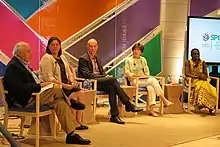Esther Ngumbi
Esther Ngumbi is an Assistant Professor of Entomology at the University of Illinois at Urbana–Champaign. She was awarded the 2018 Society for Experimental Biology Presidential Award.
Esther Ngumbi | |
|---|---|
.JPG.webp) in 2015 | |
| Born | |
| Alma mater | Kenyatta University Auburn University |
| Scientific career | |
| Institutions | University of Illinois at Urbana–Champaign Auburn University |
Early life and education
Ngumbi grew up in Kwale County, a rural farming community in Kenya.[1][2] She was introduced to farming at the age of seven, when her parents gave her a strip of land to cultivate cabbages.[3] As a child she became aware of the challenges that farmers faced, including drought and bad soils.[3] The first time she left her village was to attend Kenyatta University, where she earned her Bachelor's and Master's degrees.[4][5] In 2007 she was awarded an American Association of University Women (AAUW) International Fellowship that allowed her to complete a doctoral degree in entomology at Auburn University.[1][6][7] In 2011 she became one of the first people from her community to achieve a doctorate.[1][8] After earning her PhD she remained at Auburn University as a postdoctoral scholar.[3]
Research and career
Ngumbi is an Assistant Professor of Entomology and African-American studies and the University of Illinois at Urbana–Champaign.[9] She studies the way that herbivores, plants, micro-organisms and insects make use of volatile and non-volatile chemical signals.[9] These include Volatile Organic Compounds (VOCs) that mediate conversations between plants, herbivores and microbes.[9] Ngumbi believes that better urban agriculture can help to combat unhealthy eating.[10] In 2019 Ngumbi delivered the plenary lecture at the British Ecological Society annual meeting.[11]
Academic service and recognition

She was awarded the 2017 Emerging Sustainability Leader Award and Women of Colour Award.[12][13] In 2018 Ngumbi was awarded the Society for Experimental Biology's President's Medal.[14]
Ngumbi is an active science communicator and has contributed to Mail & Guardian, The Moth, Scientific American and the World Economic Forum.[15][16][17][18] She has appeared on Wisconsin Public Radio.[19] Ngumbi was selected by Barack Obama to be part of the Young African Leadership Initiative.[11] She mentors young researchers through the Clinton Foundation. She has campaigned for girls from rural communities to have better access to education, particularly in science and technology.[4] Working with her family, Ngumbi helped to establish Dr Ndumi Faulu Academy, a school in her hometown that serves over 100 middle school students.[1][20][21]
Selected publications
Her publications include:
- Ngumbi, Esther (2016). "Bacterial-mediated drought tolerance: current and future prospects". Applied Soil Ecology. 105: 109–125. doi:10.1016/j.apsoil.2016.04.009.
- Ngumbi, Esther (2009). "Comparative GC-EAD Responses of A Specialist (Microplitis croceipes) and A Generalist (Cotesia marginiventris) Parasitoid to Cotton Volatiles Induced by Two Caterpillar Species". Journal of Chemical Ecology. 35 (9): 1009–1020. doi:10.1007/s10886-009-9700-y. PMID 19802643. S2CID 5921837.
- Ngumbi, Esther (2012-12-01). "Comparison of associative learning of host-related plant volatiles in two parasitoids with different degrees of host specificity, Cotesia marginiventris and Microplitis croceipes". Chemoecology. 22 (4): 207–215. doi:10.1007/s00049-012-0106-x. S2CID 14865498.
References
- "4 Questions for Esther Ngumbi: Entomologist Extraordinaire". AAUW: Empowering Women Since 1881. Retrieved 2019-12-22.
- "Founders". Spring Break Kenya. Retrieved 2019-12-22.
- "Esther Ngumbi". CropLife International. Retrieved 2019-12-22.
- "Girls Leading: From Rural Economies to Global Solutions". digital.thechicagocouncil.org. Retrieved 2019-12-22.
- "Three Black Scholars Honored With Prestigious Awards". The Journal of Blacks in Higher Education. 2018-04-27. Retrieved 2019-12-22.
- iamglamscientist (2017-03-27). "Meet this young Kenyan scientist whose pioneering research led to the issuance of two US patents". Retrieved 2019-12-22.
- "Beyond Auburn Fall '11". Issuu. Retrieved 2019-12-22.
- "International Women's Day Celebrates Esther Ngumbi – Global Tiger Tales". Retrieved 2019-12-22.
- "Esther Ngumbi | School of Integrative Biology | University of Illinois at Urbana-Champaign". sib.illinois.edu. Retrieved 2019-12-22.
- "How good urban farming can combat bad eating". African Arguments. 2019-03-13. Retrieved 2019-12-22.
- "Plenary Lectures". British Ecological Society. Retrieved 2019-12-22.
- "Insects". www.mdpi.com. Retrieved 2019-12-22.
- "New Voices Fellowship". newvoicesfellows.aspeninstitute.org. Retrieved 2019-12-22.
- "President's Medal". www.sebiology.org. Retrieved 2019-12-22.
- The Moth Presents: Esther Ngumbi, retrieved 2019-12-22
- "Authors". World Economic Forum. Retrieved 2019-12-22.
- "Esther Ngumbi - Mail & Guardian". mg.co.za. Retrieved 2019-12-22.
- Ngumbi, Esther. "How to Become a Scientist Communicator". Scientific American Blog Network. Retrieved 2019-12-22.
- Brown, Gretchen (2018-03-05). "Science Should Be Accessible, Scientist Says". Wisconsin Public Radio. Retrieved 2019-12-22.
- "College to dedicate Center for Civic and Social Change". www.monmouthcollege.edu. Retrieved 2019-12-22.
- "Dr. Esther Ngumbi | Powerful Women Magazine". Retrieved 2019-12-22.